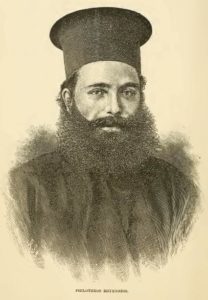
In my last post, I began a series of posts about my novel-in-progress, The Teachings, saying I would make several posts to explain what my intentions are for the series and for this particular book.
Today I’ll discuss the underlying Christian document. In Greek its title is The Didache. This translates to The Teachings. That’s the short title. The longer title is The Lord’s Teaching Through the Twelve Apostles to the Nations. It is relatively short, shorter than the Gospel of Mark, the shortest of the four canonical gospels.
What are the contents? You would think from the long title that it was a list of things the apostles said as the church formed in the years are Jesus died. The gospels told of Jesus’ life and teachings. Acts told about the formation and initial growth of the church. The Didache then gathered the teachings of the apostles. Peter said this, John said that, Matthew said this, Bartholomew said that.

But no, The Didache doesn’t quote from the apostles. Rather, it is a type of church manual. One book I read calls it the earliest church manual. It begins with a section called The Two Ways, speaking of the way a Christian should live. The two ways are called the way of life and the way of death.
After this it talks about false teachers, food offered to idols, baptism, fasting, the Lord’s prayer, and communion. A section deals with teachers, apostles, and prophets who travel among the churches and how they should behave and how the churches should greet and provide for them. Additional topics are meeting on the Lord’s day, the offices of bishops and deacons, and being watchful for the second coming of Christ.
When was it written? The relative simplicity of church government suggest it was written at an early time. The ecclesiastical hierarchy developed slowly and became burdensome sometime in the 2nd Century. The Didache seems unaware of that system. I read quite a bit about this. Scholars have suggested any time from 60 A.D. to 180 A.D. Those that favor the later date suggests that the simple church structure was the writer’s attempt to show how it was at the time of the apostles. Those who favor the earlier date point to the absence of government structure as evidence that the date of writing has to be early.
For The Teachings, I chose the earlier date. The book is set from 66 A.D to about 74 A.D. (I won’t be sure of when the book ends until I finish writing it; it may end closer to 71 A.D.
Who wrote it? No one knows, and I’ve seen no speculation about that. The two ways section is very close to a part of the Epistle of Barnabas, a non-canonical writing thought to be from the first century. Other parts of The Didiche echo other writings from outside the Bible, but nothing seems to suggest who wrote it. Most likely that will remain a mystery.

How has history treated it? That this book was once an important part of the church is evidenced by mentions of it by church fathers in the late 2nd Century up into the 4th Century. However, many years later and it was lost. No one read it; no one copied it; no one mentioned it any more. Why would it fall out of favor? Perhaps because it wasn’t considered authoritative enough to be included in the New Testament (though some early lists of Christian scriptures do include it). Possibly the primitiveness of church government made it passe once the structured church had a complicated government. Why go to the trouble of copying a book that no one used any more?
The Didache was thus known to have existed, but we had no copies of it (save for a fragment or two) until 1873. A Greek Orthodox official was looking around in a library in Turkey and found a scroll that bore a date of 1056 A.D. Several books were written on this scroll, including the complete text of The Didache. The finder published the text 1883, and within three years the collective scholars of the church, in the Middle East, Germany, Great Britain, and the USA were in an uproar, arguing about it, trying to figure out its place in the church and composition time.
For this book of mine, assuming it was put together around 66 to 71 A.D., who wrote it? Scholars see it as a composite document, not written at one time, maybe not even by one person, and perhaps not at the same place. That is the premise I’m going with. One man will primarily responsible for its assembly, but the contents will come from many places. I may even write in a delay in issuing it.
In my next blog post I’ll write about what was going on in the world at the time my man is working on The Didiche.
Dave, this is a very interesting perspective on the early Church. And the largely unknown circumstances give you a lot of room for reasoned speculation and a detailed story.
Gary: Thanks for the comment. Sources I’ve read think The Didache may have been written at different times, meaning also at different places and by different people. I plan to use that in my story. The writer is going to several places, and may not issue the finished document right away.